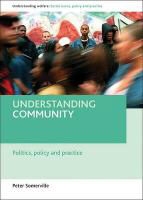Read more
In Britain, interest in community has greatly increased in recent years for a variety of reasons: New Labor's emphasis on communitarian ideals, civic renewal, and active citizenship; a growing awareness of the importance of engaging communities in order to ensure that government policies and programs are effective; and the increasing diversity of British society, which is typically described in terms of different 'communities.' At the same time, new concepts have emerged, such as community cohesion, social capital, and community capacity building, which require a clarification of the meaning of community and the purposes that the term is intended to serve. This book offers a fresh and unique perspective of the concept of community and reviews the role of the British government in defining, creating, and shaping community. It examines how far Britain has moved towards 'government through community,' including economic development, education, health, housing, and community safety. Additi
List of contents
The nature of community; Making sense of community development; The politics of community; Governmental approaches to community; Community economic development; Community learning; Community health and social care; Housing and community; Community order; Conclusion.
About the author
Peter Somerville is Professor of Social Policy and Head of the Policy Studies Research Centre at the University of Lincoln, England. He has researched and published widely on issues of housing, policing, race equality, substance misuse, homelessness, cooperative enterprise and community governance.

